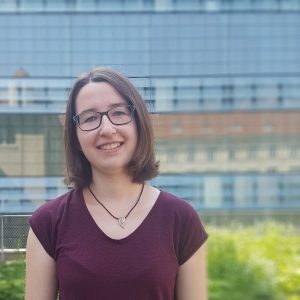ESR 14
Name: Stefanie Fuchs
Host Organisation: Graz University of Technology (TU Graz), Institute of Analytical Chemistry, Workgroup of Assoc. Prof. Torsten Mayr
Project Title: Optical sensor systems for multi-parametric monitoring and control of Organ-on-chips

The aim of the project is to establish a multi-parametric monitoring system for control of cell viability and metabolic activity in Organ-on-a-chip systems. The main working tasks of the project are:
- Integrate optical sensors into Organ-on-a-Chip devices. Optical sensors for oxygen, pH, glucose and carbon dioxide will be integrated in various organ-on-chip devices of the EUROoC-project. Therefore, I will adapt the sensor materials to the specific needs of the respective system and investigate suitable integration methods.
- Develop a multi-channel read-out system. A miniaturized device that enable the read-out of multiple sensors and parameters in parallel will be developed.
- Establish multi-parametric monitoring and control of cell viability. Using the integrated sensors and the read-out instrument I will be able to establish a multi-parametric monitoring of the tissues in Organ-on-a-Chip systems. Hence, these systems can be used to study the impact of drugs and nanomaterials on cell metabolism and viability.
- École Polytechnique Fédérale de Lausanne, Switzerland for 1 months;
- University of Twente, Nederlands for 1 month
- University of Bern, Switzerland for 1 month
- PyroScience GmbH, Germany for 2 months
- University Hospital Jena, Germany for 1 month
Stefanie studied Medical Physics (B.Sc and M.Sc) at the Heinrich- Heine University in Düsseldorf, Germany. In March 2017, she completed her bachelor thesis focusing on nanoparticles for cancer treatment. She conducted her Master project at the Loskill Lab, working on the implementation of traction force microscopy in Heart-on-a-Chip systems. After graduation in November 2018, she stayed at the Loskill Lab as research assistant focusing on chip fabrication. In July 2019, Stefanie was awarded with the Marie Skłodowska-Curie fellowship and started to work on the integration of optical sensors in Organ-on-a-Chip devices at Graz University of Technology.


 This project has received funding from the European Union’s Horizon 2020 research and innovation programme under grant agreement No. 812954.
This project has received funding from the European Union’s Horizon 2020 research and innovation programme under grant agreement No. 812954.